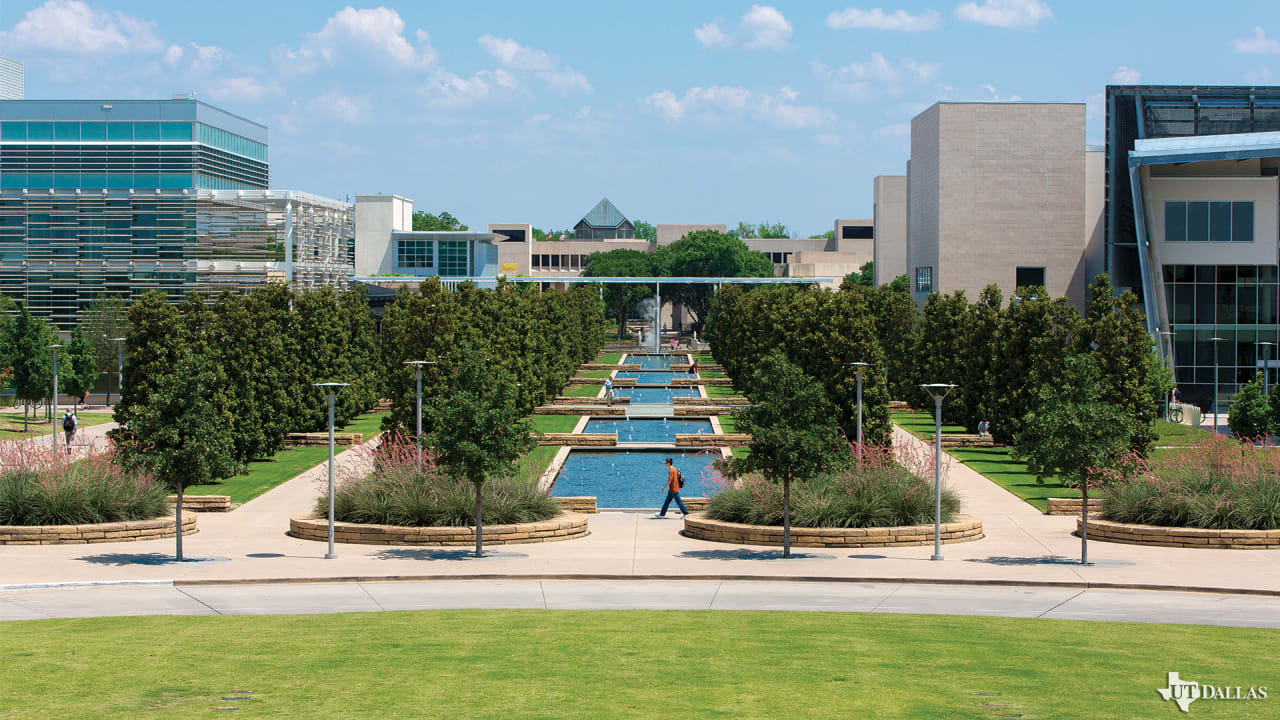
Master of Science in Computer Engineering
The University of Texas at Dallas

Key Information
Campus location
Richardson, USA
Languages
English
Study format
On-Campus
Duration
2 years
Pace
Full time
Tuition fees
USD 18,276 / per semester
Application deadline
Request info *
Earliest start date
May 2024
* late application deadline: day prior to classes begin
Introduction
The MS in Computer Engineering program prepares students for leadership roles in research, development, and design positions that require the use of skilful and imaginative solutions to engineering problems. Students who have earned a BS degree may apply to the MS in Computer Engineering program. The Computer Engineering curriculum calls for a balanced knowledge of both algorithm/software and circuitry/ hardware. The program has been carefully designed for students to gain a breadth of knowledge in software and hardware development, and it is flexible enough for students to specialize in the area of their choice.
Courses and research are offered in a variety of subfields of computer engineering, including operating systems, computer architecture, computer graphics, pattern recognition, artificial intelligence, machine learning, embedded systems, computer networks, software systems, analysis of algorithms, parallel processing, VLSI, computational geometry, design automation, cybersecurity, information assurance, and data science.
Admissions
Curriculum
Degree Requirements
The MS in Computer Engineering requires a minimum of 33 semester credit hours.
All students must have an academic advisor, an approved degree plan, and complete either an internship or practicum course. Courses taken without advisor approval will not count toward the 33 semester credit hour requirement. Each student must complete either an internship or the practicum course following the completion of 18 semester credits hours. Successful completion of the approved course of studies leads to the MS in Computer Engineering degree.
The MS in Computer Engineering program has both a thesis and a non-thesis option. All part-time MS in Computer Engineering students will be assigned initially to the non-thesis option. Those wishing to elect the thesis option may do so by obtaining the approval of a faculty thesis supervisor.
All full-time, supported students are required to participate in the thesis option. The thesis option requires six semester credit hours of research (of which three must be thesis semester credit hours), a written thesis submitted to the graduate school, and a formal public defence of the thesis. The supervising committee administers this defence and is chosen in consultation with the student's thesis advisor prior to enrolling for thesis credit. Research and thesis semester credit hours cannot be counted in an MS in Computer Engineering degree plan unless a thesis is written and successfully defended.
Concentrations
One of the two concentrations listed below, subject to approval by a graduate advisor, must be used to fulfil the requirements of the MSCE program. Each concentration is defined by four core courses. A student must complete the remaining courses from the department and school-wide electives. Students must achieve an overall GPA (grade point average) of 3.0 or better, a GPA of 3.0 or better in their core MSCE classes, and a grade of B- or better in all their core MS in Computer Engineering classes in order to satisfy their degree requirements. One 5000 level computer engineering course can be counted towards the graduate semester credit hours.
Embedded Systems Concentration:
The focus of embedded systems concentration in computer engineering is on embedded processors. The emphasis of the courses in this concentration is placed on hardware/software aspects of embedded processors to achieve various computer-controlled tasks.
Each student must complete a total of 33 hours from three categories:
I. CE-Depth (Core) Courses: 12 semester credit hours
Each student must complete the following four (4) CE-Depth courses making a B- or better in each course and an overall GPA of 3.0 or better in the Core courses:
- CE 6304 Computer Architecture
- CE 6302 Microprocessor and Embedded Systems
- CE 6370 Design and Analysis of Reconfigurable Systems
- EESC 6367 Applied Digital Signal Processing
II. CE-Breadth Electives Courses: 12 semester credit hours
Each student must complete four (4) CE-Breadth Electives courses from the following two groups:
Group 1
Any two (2) of the following six (6) courses:
- CE 6301 Advanced Digital Logic
- CE 6325 VLSI Design
- CE 6303 Testing and Testable Design
- CE 6306 Application Specific Integrated Circuits Design
- CE 6375 Design Automation of VLSI Systems
- EESC 6360 Digital Signal Processing I
- EESC 6364 Machine Learning and Pattern Recognition
Group 2
Any two (2) of the following six (6) courses:
- CE 6308 Real-Time Systems
- CS 6313 Statistical Methods for Data Science
- CS 6324 Information Security
- CS 6360 Database Design
- CS 6363 Design and Analysis of Computer Algorithms
- CS 6375 Machine Learning
- CS 6378 Advanced Operating Systems
- CS 6390 Advanced Computer Networks
Non-Thesis Option: The students must take any two courses in Group 1 and any two courses in Group 2.
Thesis Option: The students must take one course in Group 1, one course in Group 2, and MS in Computer Engineering Thesis. The student can choose to take either one MS in Computer Engineering Research course or an additional course in Group 1 or Group 2. Pre-approval by MS Thesis advisor is required.
III. ECS Free Electives: 9 semester credit hours
Each student must complete three (3) ECS Free Electives courses that satisfy the following:
- Must be a course at ECS School.
- Only one 5000 level course is allowed if: (a) is a pre-requisite to a course in the list above, and (b) it precedes the 6000 level course.
- Only one Special Topic is allowed.
- Pre-approval is required for: (a) one independent study (by a faculty advisor), and (b) up to two non-ECS courses (by MS Thesis advisor).
Computer Systems Concentration:
The focus of computer systems concentration in computer engineering is on general-purpose and advanced computer systems. The emphasis of the courses in this concentration area is placed on hardware/software aspects of computer systems to achieve various computing tasks
Each student must complete a total of 33 hours from three categories:
I. CE-Depth (Core) Courses: 12 semester credit hours
Each student must complete the following four (4) CE-Depth courses making a B- or better in each course and an overall GPA of 3.0 or better in the Core courses:
- CE 6304 Computer Architecture
- CE 6325 VLSI Design
- CS 6363 Design and Analysis of Computer Algorithms
- CS 6378 Advanced Operating Systems
II. CE-Breadth Electives Courses: 12 semester credit hours
Each student must complete four (4) CE-Breadth Electives courses from the following two groups:
Group 1
Any two (2) of the following six (6) courses:
- CE 6301 Advanced Digital Logic
- CE 6302 Microprocessor and Embedded Systems
- CE 6303 Testing and Testable Design
- CE 6306 Application Specific Integrated Circuits Design
- CE 6370 Design and Analysis of Reconfigurable Systems
- EESC 6367 Applied Digital Signal Processing
Group 2
Any two (2) of the following six (6) courses:
- CE 6308 Real-Time Systems
- CS 6324 Information Security
- CS 6353 Compiler Construction
- CS 6360 Database Design
- CS 6375 Machine Learning
- CS 6390 Advanced Computer Networks
Non-Thesis Option: The students must take any two courses in Group 1 and any two courses in Group 2.
Thesis Option: The students must take one course in Group 1, one course in Group 2, and MS in Computer Engineering Thesis. The student can choose to take either one MS in Computer Engineering Research course or an additional course in Group 1 or Group 2. Pre-approval by MS Thesis advisor is required.
III. ECS Free Electives: 9 semester credit hours
Each student must complete three (3) ECS Free Electives courses that satisfy the following:
- Must be a course at ECS School.
- Only one 5000 level course is allowed if: (a) is a pre-requisite to a course in the list above, and (b) it precedes the 6000 level course.
- Only one Special Topic is allowed.
- Pre-approval is required for: (a) one independent study (by a faculty advisor), and (b) up to two non-ECS courses (by MS Thesis advisor).
Career Opportunities
Graduates of the program seek positions such as Software Design Engineer, Computer Engineer, Hardware Design Engineer, and Systems Consultant for public and private sectors. Computer Engineering graduates find employment in local, national and international enterprises.
Facilities
English Language Requirements
Certify your English proficiency with the Duolingo English Test! The DET is a convenient, fast, and affordable online English test accepted by over 4,000 universities (like this one) around the world.